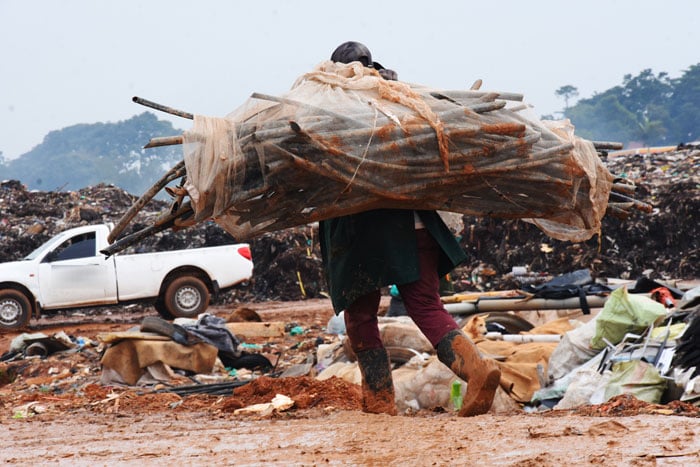Govt to support women at Kiteezi landfill

A man carrying plastic pipes after sorting them from the waste in Kiteezi landfill. PHOTO/MICHAEL KAKUMIRIZI
The Ministry of Gender, Labour and Social Development has pledged to work with non-governmental organisations to support vulnerable women who work at the garbage dumping site at Kiteezi, Wakiso District, to attain a decent livelihood.
The women who work at the Kiteezi landfill, sitting on 36 acres of land, are some of the most urban poor, working under deplorable conditions, not able to educate their children and cannot afford a decent meal a day.
But the Commissioner for Youth and Children Affairs at the Gender Ministry, Mr Kyateka Mondo, said they are ready to help the women acquire entrepreneurial skills and give them funds to empower them economically.
“We need to know that poverty anywhere is a threat to prosperity everywhere. It must interest us to check poverty levels...We need to close the gap between the rich and the poor,” he said.
Mr Kyateeka was speaking last Friday at the opening of the office of Kiteezi Samaritan, a not-for-profit organisation affiliated with International Samaritan, which works to uplift the standards of people working at dumping sites in different parts of the world.
He explained that the ministry would fast-track access to livelihood funds such as the Uganda Women Entrepreneurship Programme (UWEP) for those who work at the dumping site.
Mr Kyateka said they want to create an environment where children, youth, and women can lead fulfilling and dignified lives to contribute towards the transformation of Uganda.
The Wakiso District Community Development Officer, Mr John Kyejusa, said: “Government programmes can’t reach every individual but with such organisations, they can help extend the services.”
The Executive Director of Kiteezi Samaritan, Mr David Kafambe, said since they started supporting women working at Kiteezi dumpsite about six months ago, they have been able to improve the lives of 75 families through entrepreneurial skills and also giving scholarships to 200 of their children.
“Someone working in a garbage dumpsite is the lowest level someone can have with so many health hazards but we come to walk hand in hand with them and support them to break the barrier of poverty,” Mr Kafambe said.
He said they would invest more than Shs1.5 billion in the programme this year.



